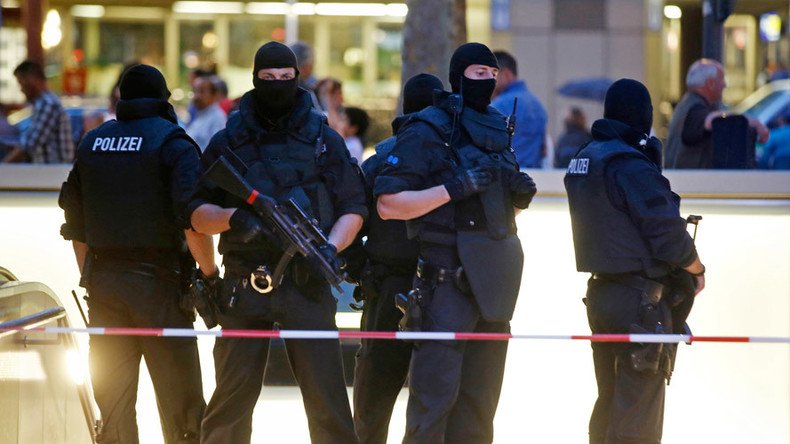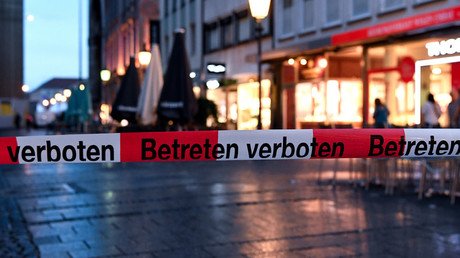Preventing Munich attack was ‘mission impossible’

With thousands of soft targets such as malls etc. surrounding us, security services can’t protect them all. If they did, we’d live in a police state and under constant surveillance, says James Conway, ex FBI agent and CEO of Global Intel Strategies.
READ MORE: 18yo German-Iranian goes on shooting rampage in Munich: Facts known so far
RT: We’ve had a lot of these lone-wolf attacks recently. Is it even possible to prevent attacks like these - like the one we saw in Munich - given a perpetrator had no previous criminal record and no reason to suspect them?
James Conway: No, it’s a mission impossible. That’s the quick answer. The reason being as this was a typical soft target. It’s an open, non-secure McDonald’s where people are free to come and go. Look, there is a category of hard targets which are military bases, government buildings, banks. Things like that are hard targets. But we are surrounded by literally thousands and thousands of soft targets. Those are restaurants, malls, parks, shopping esplanades and so forth.
There are just thousands of these surrounding us in all of our countries. And police and security services cannot harden all those targets. If they did we’d live in a world that was a police state and a world of constant surveillance. You just can’t protect all these targets.
RT: Many people on social media now say that the German authorities should have prevented this attack in light of the recent ax attack on a train in southern Germany. Do you think this is fair?
JC: Look, you can’t blame the police for this. The police cannot be everywhere for everybody at all times. It’s impossible. This is a bigger issue. This is a diplomatic issue…It’s an issue involving border security. It’s an issue involving refugees. It’s an issue involving lots of things. You cannot protect all soft targets in a country the size of Germany, or France or the United States, Russia – anywhere. It’s virtually impossible.
The important thing that the police and the intelligence services have to do and we all must do - but we’re drinking from the fire hose today - is through intelligence identify those individuals, those cells that could represent a threat to us and try to neutralize those threats before they are able to come into play. But this guy was really an anomaly.
Initially, when I looked at this, everybody initially thought this was going to be [Islamic State or IS] ISIS-related. ISIS has been losing a lot of territory; a lot of their attacks lately have been in retribution for losing territory, against soft targets in Europe. But this young fellow, now…preliminary reports said he is an 18-year-old Iranian-German. Iranians are Shia [Muslim]. Shia and ISIS are at war in the Syrian-Iraq theater. So this doesn’t even fit anything, goes outside the model of any kind of ISIS attack. This guy was Iranian. He was most likely Shia, not Sunni. So this whole thing is kind of strange.
#Munich shooter urged victims to come to mall via bogus Facebook account - police https://t.co/BNnRk5x8r3
— RT (@RT_com) July 23, 2016
There are some reports that he was yelling ‘Allahu Akbar’ but I don’t know if this is going come to the surface. And the police and the Germans and their colleagues will drill down and get into his cellphone and get into his chatrooms, look at his social media and try to find out the motive behind this. We don’t know yet and we won’t know probably for another 24 or 48 hours. But getting back to your point, it is virtually impossible to blame the police. The police are a very small percentage of the population of Germany and they cannot control all soft targets. It’s just impossible.
RT: Do you think we’re going to see tougher security measures like mass surveillance now introduced after the string of these terrorist attacks in Europe?
JC: Look, I don’t think we’re going to see mass surveillance. Look, the French have increased security significantly. In the wake of these kinds of thigs we’ve seen laws changed in France. We’ve seen an upping of intelligence gathering. We’ve seen an increase in electronic surveillances and so forth. That’s a natural reaction. We may see that in Germany. The bottom line is - we may begin to see what were previously soft targets now become harder targets. You know, in many parts of the West - hotels, for example - were always soft targets. They were public places. People could always come in and out of hotels. [In] many places in the world where I travel and, particularly, if you are in the Middle East – [in] most hotels nowadays you must go through a magnetometer, you must go through a security check.
So we’ve seen an evolution of previously soft targets now becoming hard targets. We may see that in Germany, we may see that over the holidays in the malls, for example. There may be security checks in malls and so forth. There may be more security checks at railroad stations. We may see an increase in security checks just because the threat level is as high as it’s ever been in the last 25-30 years.
RT: The fingerprint of this attacker is just so bizarre and so unusual. We’re looking at a main suspect who is 18 years old, a German citizen though, but of Iranian origin and appeared to have been living in Germany for a long time, but also a possibility of racist, nationalist and anti-migrant slurs. How to make sense of this?
JC: Well, we don’t. But I think it’s coming out of cyberspace because young people today are just flooded with all of this radical jihad, all of this radical propaganda in chat rooms, in cyber space, in electronic magazines and publications online. And I think that there’s actually been some discussions in intelligence circles - and we saw it in Nice - that there are some indications that the perpetrator in Nice, the Tunisian, may have had a history of some mental problems.
So we’re beginning to see that maybe people that are on the edge, on the margins and may not be mentally fully stable, maybe being influenced by some of this extreme radical jihadi propaganda that we’re seeing in cyberspace. Intelligence folks and theorists, and academicians are beginning to look at some of those theories. And we don’t know yet…
The statements, views and opinions expressed in this column are solely those of the author and do not necessarily represent those of RT.













